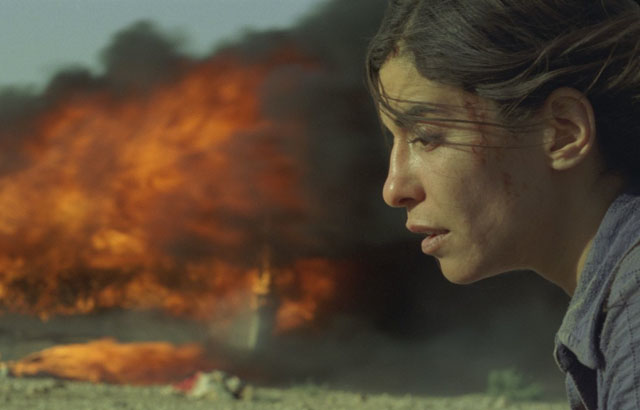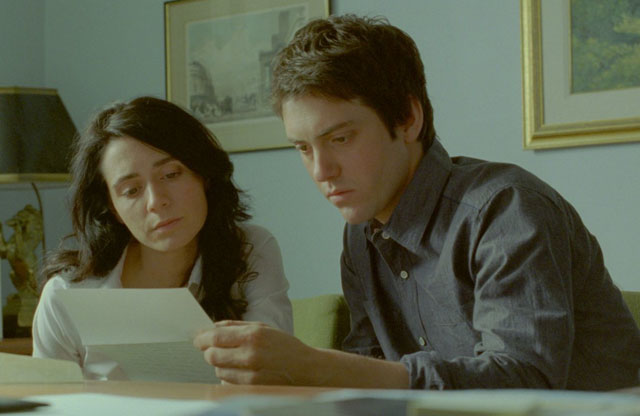CHICAGO – Patrick McDonald of HollywoodChicago.com audio review for the doc series “Charlie Hustle & the Matter of Pete Rose,” about the rise and bitter fall of the major league legend, the MLB’s all-time hits leader, only to be banned from the sport because of gambling. Streaming on MAX and on HBO since July 24th.
Horrors of War Create Mystery in ‘Incendies’
 Rating: 4.0/5.0 |
CHICAGO – One of the most honest aphorisms is “the first casualty of war is truth.” Those obscured facts are often the ones that come back to haunt future generations, and that is exceptionally illustrated in the new film “Incendies.” Piecing together a mother’s wartime activities become the basis for solving a mystery after her death.
The mystery yields a number of shocking revelations, but none more shocking than framing a reserved Jordanian immigrant, leading a normal life in Canada, as a soldier in a wartime frenzy that results in her being a political prisoner of war. Incendies allows for the events of the past to unfold through her twin children, destined to complete her journey and allow her to rest in peace.
The film begins with the reading of a will. Twin siblings Jeanne (Mélissa Désormeaux-Poulin) and Simon (Maxim Gaudette) get odd instructions rather that the normal recitation of estate. Their deceased mother Nawal (Lubna Azabal) is asking them to solve the mystery of their parentage, which includes a half-brother that they’ve never met. They are to travel back to the villages in Middle East Jordan, to piece together Nawal’s life there and understand where they have come from, eventually to deliver letters to the father and the son if they are alive.
The brother is reluctant, so it is up to Jeanne to start the process, and as she visits the Middle East locations of Nawal’s life there are a series of flashbacks that tell the story. It is a religious war, and warring tribes are practicing ethnic cleansing. A pregnant Nawal gives birth and the child is taken from her, ends up in a orphanage. She obsessively begins searching for him, and in that obsession becomes embroiled in the conflict.
 Photo credit: Sony Pictures Classics |
Her actions in that war are grounds for capture, and although she becomes a heroic figure as a political prisoner, her stay at the jail is rife with brutality, subjugation and rape. Her release is quickly followed by her escape to Canada, where she gives birth to the twins, lives out her years and has the circumstances of her past life come back to haunt her shortly before she dies. As the pieces of this puzzle fall into place, Jeanne and Simon get more understanding about the happenstance that defines their mother, and subsequently themselves.
The centerpiece performance is Lubna Azabal as Nawal. She plays the warrior and war victim through giving birth, the journey to find her son, the political prisoner and in old age during the Canada years. She maintains a stoic mask of blank courage, able to navigate through the pitfalls with a canny survival instincts. She symbolizes a certain immigrant in wartime, the one that doesn’t give up on their country of origin, but rather the country gives up on them.
The locations become important to the story and are intuitively selected by the production team and director Denis Villeneuve. The contrast between the safe harbor in Montréal and the war torn streets of Jordan effectively symbolize the double life of Nawal. It’s as if the stark desert landscape of the Middle East can never be conquered, and civilization is realized only in the Great White North, where one of the most significant scenes takes place in the cool waters of an apartment pool.
In the flashback sequences, Nawal’s politics seem behind her quest to find her son. so the transition to the political prisoner persona is a bit abrupt, and never fully explained except in her anger. The shift to warrior seems to have secret motivations, there weren’t enough overt activism presented to satisfy that alteration, but it was necessary to get her to prison and the final chapter in her homeland.
Does Nawal symbolize the entire country, and is the civil war presented taking a point of view? This was another historical example for the cleansing of the Palestinian Muslims (Nawal is Christian) and her brutality and the brutalization against her is indicative of the larger futility of war and its victims. The process of solving her mystery exposes more tragedy, but in a sense Nawal, and her country, cannot rest in peace until the truth is revealed.
 Photo credit: Sony Pictures Classics |
It is Nawal’s son and daughter, with seemingly normal Canadian lives, that also have to process this truth. The opening up of honest realities can blossom like a flower, for the truth might be painful, but it’s the only thing that can truly set us free. Unraveling a life can be complicated and messy, but Incendies expresses that the fullest view of a deceased person’s life, in relation to the lives left behind, is beneficial in allowing the soul survivors to flourish.
As the United States approaches ten years in its various wars and interactions, the lesson in Incendies is about the scars that linger, and the lies that deepen those scars. Wars are based on territorial gain and prejudicial actions against the “other.” There are consequences, always consequences.
 | By PATRICK McDONALD |


